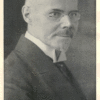Tag: Biblical
Biblical Studies Has Failed the City of God
I read NT exegetes, particularly in their commentaries on Paul’s theology, and wonder if they ever wonder if they should in fact be doing so from the theo-logic inherent to the homoousion (the notion that Jesus is both fully God and fully human). Most don’t do this, which illustrates the flaw of their discipline-specific training in Biblical Studies. In other words, just as anti-supranaturalism has yeasted the discipline itself—that is to say, to approach the Bible as if it doesn’t have an inner, antecedent, supranatural reality; and that it can be read purely and critically as a historical artifact—it is…
Barth’s, “Biblical Revelation”
Portrait des Theologen Karl Barth in Basel. Photographie 1956. Portrait of the theologian Karl Barth in Basel. Photography. 1956. I was chided back in the day by some Princeton Theological Seminary, at that point, MDiv students (who now have their PhDs from the same school), by referring to Scripture as containing biblical revelation; and this with Barth’s theology as the broader background. These guys asserted that Barth would never refer to the Bible as containing “revelation” of God. And yet clearly these lads had never really even read Barth in depth. Barth’s doctrine of the Threefold Form of the Word…
The Bible’s Meaning as Near as Your Next Prayer: On a Biblical Hermeneutics
For some reason there are many Christians, through the centuries even, who want to make an attempt at reading Holy Scripture without reading it from its God-given context in Jesus Christ. That is to say, there are Christians who want to read the Bible from a christologically contextless frame wherein the Bible becomes a wax-nose given shape by their wits and capacity to marshal the latest reading strategies of the day. But the Bible isn’t a book like that. It isn’t open to naturalist or immanentist frames of reference. It has its whole and its parts altogether, in regard to…
A Screed on the Relationship Between the Biblical Exegete and Theologian
When people say that theology isn’t really biblical studies, they fail to understand what theology is doing. Good theology is engaging with the inner theo-logic of the text of Holy Scripture and its reality in Jesus Christ. It’s engaging with the underlying notions that allow the Scripture writers to write and assert what they do about God. It’s identifying the theological ontological ground that sees Scripture in its taxis or order vis a vis as an instrument of the living and triune God. Good theologians are engaging with the Holy, as such, they unswervingly trust that God is a good…
What Hath the Biblical Critics To Do with the Confessors?
Last night at work, as I’m prone to do, I was praying and thinking about—for some reason—the role that non-Christian biblical exegetes and commentators can have for the confessing Christian reading of Holy Scripture. When I was writing my Master’s thesis on I Corinthians I used a few commentators who would fit the higher critical non-confessional mold of a biblical exegete; one of these was Hans Conzelmann. He helped me work through some issues that the “evangelical commentators” weren’t. I think such critics can actually provide a fresh view of things without the oft ecclesial accretions that might attend the…
A Running Thought on Biblical Inerrancy
I am still a doctrinal (fundamentalist) evangelical in many ways. On a doctrine of biblical inerrancy: I am so committed to the intent that “inerrancy” intends to communicate that I’m beyond an inerrantist. My view of Scripture is “contexted” Christologically and thus soteriologically such that any type of abstract philosophical frame for a doctrine of inerrancy simply will not do. My view is confessional and even via antiqua, as I see an ontology of Holy Scripture funded protologically by God’s free election to be for the world in Jesus Christ. In a theological taxis then, my doctrine of Scripture has…
A More Responsible Way to Think About Biblical Eschatology: Engaging with Karl Heim Through TF Torrance
The following is a repost from September 25, 2018. It is this kind of thinking that moved me from a premillennial understanding of the last times, to an amillennial perspective (although I still retain the right to a historic premillennial perspective depending on the moment). The following post sounds like I have no interest or time for paying attention to geo-political and theopolitical trends as those might or might not pertain to God’s inbreaking into the world in an end times type of way. I am a futurist, I think you have to be because Jesus was; because the Old…





